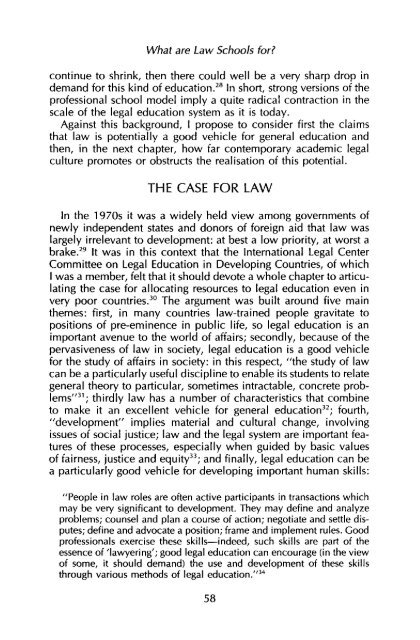Blackstone's Tower: The English Law School - College of Social ...
Blackstone's Tower: The English Law School - College of Social ...
Blackstone's Tower: The English Law School - College of Social ...
Create successful ePaper yourself
Turn your PDF publications into a flip-book with our unique Google optimized e-Paper software.
What are <strong>Law</strong> <strong>School</strong>s for?<br />
continue to shrink, then there could well be a very sharp drop in<br />
demand for this kind <strong>of</strong> education. 28 In short, strong versions <strong>of</strong> the<br />
pr<strong>of</strong>essional school model imply a quite radical contraction in the<br />
scale <strong>of</strong> the legal education system as it is today.<br />
Against this background, I propose to consider first the claims<br />
that law is potentially a good vehicle for general education and<br />
then, in the next chapter, how far contemporary academic legal<br />
culture promotes or obstructs the realisation <strong>of</strong> this potential.<br />
THE CASE FOR LAW<br />
In the 1970s it was a widely held view among governments <strong>of</strong><br />
newly independent states and donors <strong>of</strong> foreign aid that law was<br />
largely irrelevant to development: at best a low priority, at worst a<br />
brake. 29 It was in this context that the International Legal Center<br />
Committee on Legal Education in Developing Countries, <strong>of</strong> which<br />
I was a member, felt that it should devote a whole chapter to articulating<br />
the case for allocating resources to legal education even in<br />
very poor countries. 30 <strong>The</strong> argument was built around five main<br />
themes: first, in many countries law-trained people gravitate to<br />
positions <strong>of</strong> pre-eminence in public life, so legal education is an<br />
important avenue to the world <strong>of</strong> affairs; secondly, because <strong>of</strong> the<br />
pervasiveness <strong>of</strong> law in society, legal education is a good vehicle<br />
for the study <strong>of</strong> affairs in society: in this respect, "the study <strong>of</strong> law<br />
can be a particularly useful discipline to enable its students to relate<br />
general theory to particular, sometimes intractable, concrete problems"<br />
31 ; thirdly law has a number <strong>of</strong> characteristics that combine<br />
to make it an excellent vehicle for general education 32 ; fourth,<br />
"development" implies material and cultural change, involving<br />
issues <strong>of</strong> social justice; law and the legal system are important features<br />
<strong>of</strong> these processes, especially when guided by basic values<br />
<strong>of</strong> fairness, justice and equity 33 ; and finally, legal education can be<br />
a particularly good vehicle for developing important human skills:<br />
"People in law roles are <strong>of</strong>ten active participants in transactions which<br />
may be very significant to development. <strong>The</strong>y may define and analyze<br />
problems; counsel and plan a course <strong>of</strong> action; negotiate and settle disputes;<br />
define and advocate a position; frame and implement rules. Good<br />
pr<strong>of</strong>essionals exercise these skills—indeed, such skills are part <strong>of</strong> the<br />
essence <strong>of</strong> 'lawyering'; good legal education can encourage (in the view<br />
<strong>of</strong> some, it should demand) the use and development <strong>of</strong> these skills<br />
through various methods <strong>of</strong> legal education." 34<br />
58

















